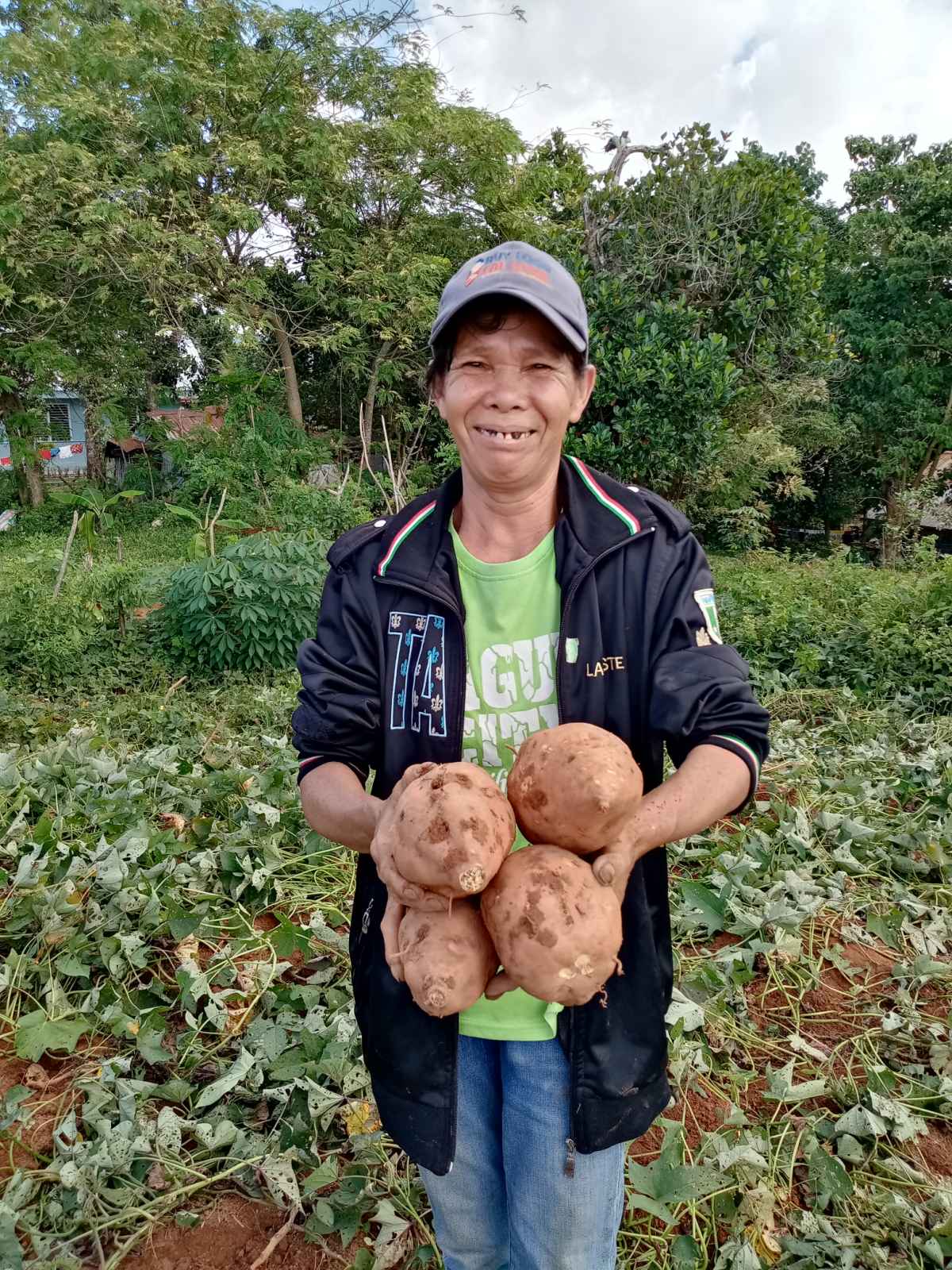Typhoon-Ravaged Farmers Find Hope in USAID Sweet Potato Project
02-03-2022The sun was not yet so high for that time in the morning, but it was starting to bite for the group of farmers who worked in stoic silence on their plot of land. It was a scene repeated in countless other upland villages of Isabela Municipality, in the Island of Negros. But for 52-year-old Rolyn Sayson and her group, today’s work was special.
As Rolyn dug, she was starting to like what she was seeing. With help from another farmer, she pulled out a sweet potato tuber the size of a large shoe. She needed both hands just to feel for its weight. Two other farmers soon came to heft the thing, testing it for themselves, and for the first time that morning, smiles and the slight hint of chuckles could be heard. Such moments of levity it turns out, was rare of late for these farmers of Isabela.
When Typhoon Rai rampaged through Negros Island, Philippines on December 17, 2021 people had dim expectations of whatever small mercies the Category 5 cyclone would bring them. As the battered communities of Negros emerged from their village storm shelters at dawn, their relief at being alive was damped by the bleak sight that greeted them.
For the upland farming communities, Typhoon Rai had a particularly more lasting bite. In Rolyn’s mountain village, not a single house was spared from the typhoon’s wrath. But while houses can be re-built, the typhoon’s damage to their crops and primary means of living was a serious concern.
“Before this, life was hard, we did not have any fixed income. After the Typhoon, we felt that we had to start all over again,” explained Rolyn. “We had to rebuild our houses and establish our livelihood. Thankfully, we still have something to look forward to the GROW Coop Project which helps us with our sweet potato livelihood.”
GROW Coop
GROW Coop is a USAID-funded project working to create new and sustainable livelihoods for upland communities in Negros Island. Implemented in partnership with Agriterra through its local partner in Negros, Citicore-Candlewick Bioenergy Inc. (CCBI), the USAID project is harnessing multi-stakeholder partnerships and taking advantage of the opportunities created -- opportunities that farmers like Rolyn sorely need.
“Partnerships work,” said Rick LaCroix, President of CCBI. “We make sure to involve every stakeholder in the spectrum for maximum effect. The company couldn’t go it alone. If it weren’t for USAID’s catalytic support, none of these would have happened for our communities.”
Rolyn’s group of farmers is but one of the half-dozen agricultural cooperatives participating in GROW Coop activities in Negros Island. This translates to over a 150 upland households that stand to benefit from the project. In its bid to improve the socio-economic conditions of upland communities and expand rural livelihood opportunities, the GROW Coop project in Negros is demonstrating the usefulness of tapping into local resources and technologies. In the case of Negros, sweet potato was found to be an ideal resilient crop enjoying a healthy demand from local markets.
Jun Virola, GROW Coop Chief of Party and Agriterra Business Advisor echoed the partnership approach. “We support these developments especially the efforts of CCBI as a GROW Coop (LRO) in successfully facilitating these partnerships for the development of the smaller agri coops. This is a good example of the outcome of GROW Coop — to strengthen the position of agri coops in terms of the market, the government, and the private sector.”
Isabela Municipality’s Mayor couldn’t agree more. Mayor Irene Montilla of Isabela Municipality was among the first project partners GROW Coop turned-to to help out. Local Government Units (LGUs) often have their hands full addressing post-calamity recovery needs of their constituents and this is where partnerships prove essential.
“The LGU of the Municipality of Isabela is very happy to partner with CCBI for the GROW Coop Project and to provide help to the farmers for the improvement of their livelihood”, the mayor shared. “We hope that the sweet potato cuttings, farming materials, logistics and financial assistance that we gave them will enable them to reach their dreams of being progressive and successful cooperatives.”
More help would come, this time from the academic community. To teach agricultural cooperatives how to best produce sweet potato, GROW Coop partnered with the Central Philippine State University (CPSU), an institution pioneering a new sweet potato production system called the Green Mining Technology. Located 25 miles south of Isabela, CPSU has a vibrant extension program and was happy to train the GROW Coop cooperatives in the Green Mining Technology system.
“We hope that this technology could bring more help and support to your projects,” said Rhaprap Tondo, a CPSU Faculty and Project In-Charge of the university’s Green Mining Technology Project. “Our door is always open to share whatever technology that we have in our university in order to help our clienteles and the community to uplift their standard living.”

Rolyn Sayson, a farmer of Isabela Municipality, with her latest sweet potato harvest made possible through USAID’s GROW Coop Project.
Open doors are always welcome. Back in Isabela, Rolyn’s pilot farm plot, the size of a two-car garage, has yielded 120 kilos of sweet potato tubers with buyers already waiting at the wings. The group is happy and hopeful with the results.
“We will strive and work hard to make this business successful,” Rolyn concluded.
Plans on extending the sweet potato plot to a full hectare in Isabela are in the works as are moves to provide the five other agricultural cooperatives in the province with peer-to-peer exchange based on the Isabela farmer’s experience. As Rolyn’s group gather their tools, their sacks of sweet potato now in tow, they begin their eager trek to get back to the village and out of the sun.
